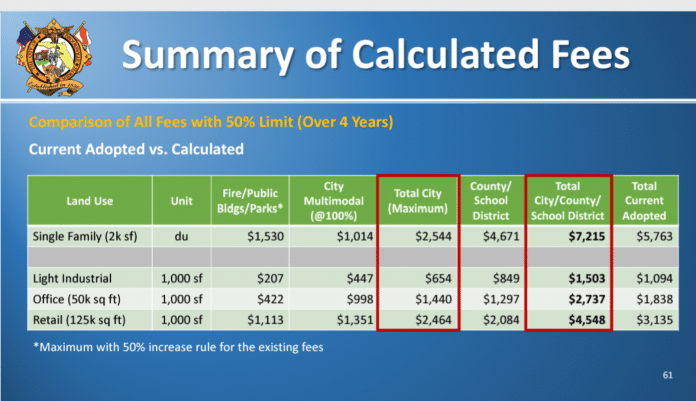The city of Brooksville is contemplating a hike in impact fees. Monday, Jan. 24, before the year 2022 was a month old, City Council was presented with a technical draft report funded by the city on just how they might raise them. Some are concerned that higher impact fees are needed to pay for new economic development and the burden it places on city infrastructure, however, other council members showed little support for raising impact fees.
In November 2020, Brooksville City Council hired Tindale Oliver, a Tampa-based transportation and community planning organization, to study and develop impact fee calculations to best determine how high the city can raise impact fees on new residential and commercial development and other venues. The city claims new impact fees may be needed to pay for fire-rescue, public buildings, parks and recreation and multi-modal transportation services in the future.
Tindale Oliver’s study uses a consumption-based impact fee methodology and casts a wide net including a demand component of multi-modal transportation that estimates “person-miles of travel.” The Tindale representative also deciphered consumption-based impact fee charges meant to recover developers’ proportionate share of the cost of providing additional infrastructure available for use by new growth.
Council Member Robert Battista suggested the city is not experiencing or forecasting a rapid rate of growth in the near future. “I don’t see us doing anything due to increased population in the next five years,” he said.
Increasing impact fees often leads to rising costs for residents. For example, in residential development, new impact fees would be paid by developers and builders. Those new impact fees, like existing impact fees, would likely be passed along by developers to homeowners, renters and businesses. Separately, the multi-modal transportation element of the proposed impact fees allows the city to assess higher impact fees on new development to collect a proportional share of the cost of city investment in multimodal transportation systems.
One of Battista’s concerns was how to spend the money in the case that such funding was not actually required. “I’m having a hard time understanding how we’re going to spend this money, legally,” said Battista.
To that end, the financial impact on the city’s budget and potentially on Brooksville residents would be relative to the increases in impact fees adopted by City Council. The higher impact fees will “create revenue to support necessary infrastructure, due to growth in the City,” according to city documents.
At one point, Council Member Blake Bell asked the Tindale Oliver representative “what is the difference between an impact fee and a tax” to which she responded an impact fee is levied against future development and spent on predetermined needs within city departments whereas a tax goes to general fund and can be used on anything the city requests.
Should the city opt for the maximum impact fee increase, over 4 years impact fees on future development would increase from the current $5,763 to $7,215 per 2,000 square feet of single-family land use.
Brooksville contracts with the Hernando County Sheriff’s Office to police the city, while the state funds traffic lights. According to the U.S. Census Bureau, Brooksville added 824 residents to its population between 2010 and 2020, increasing from 7,719 to 8,890.

